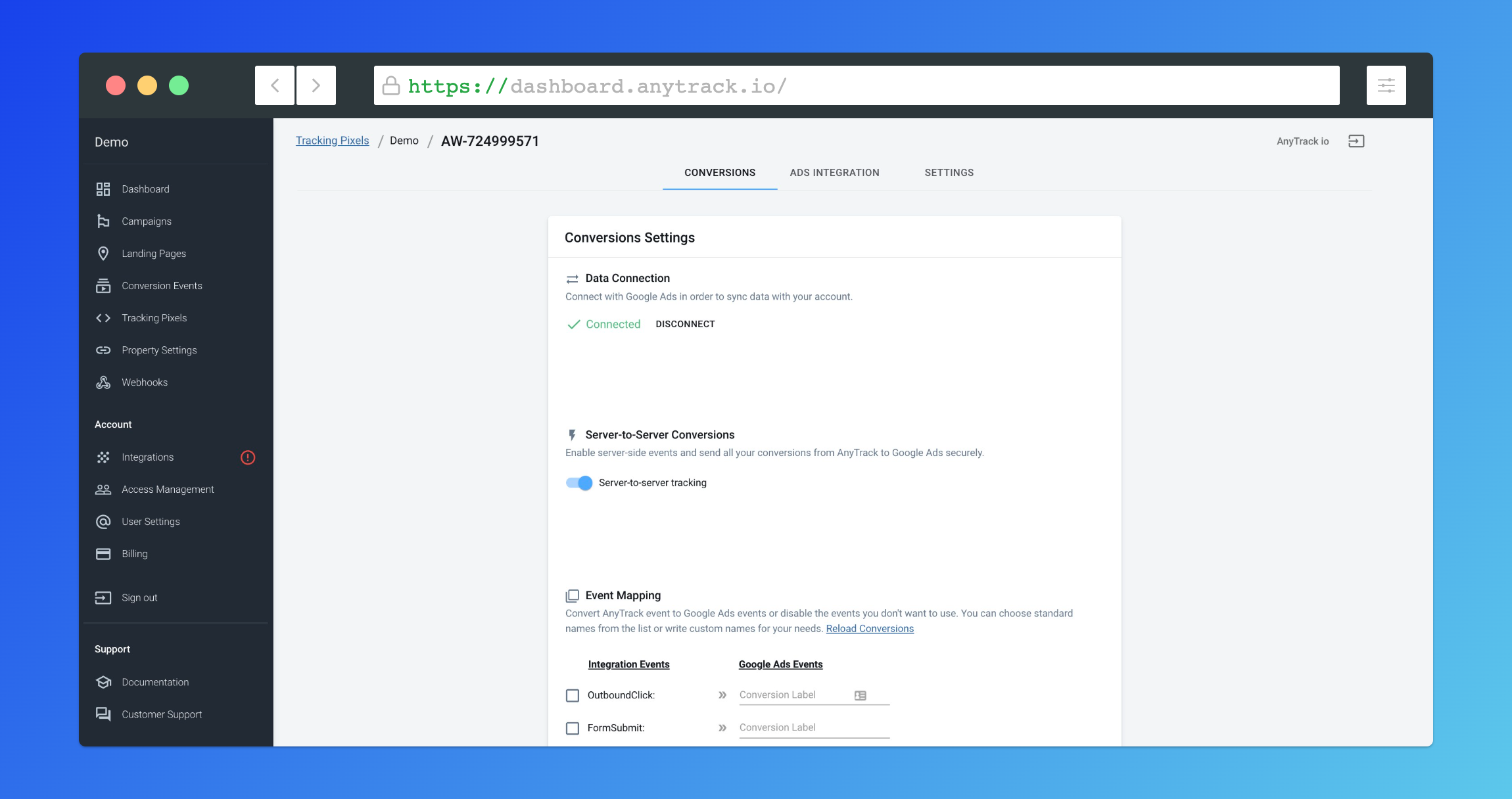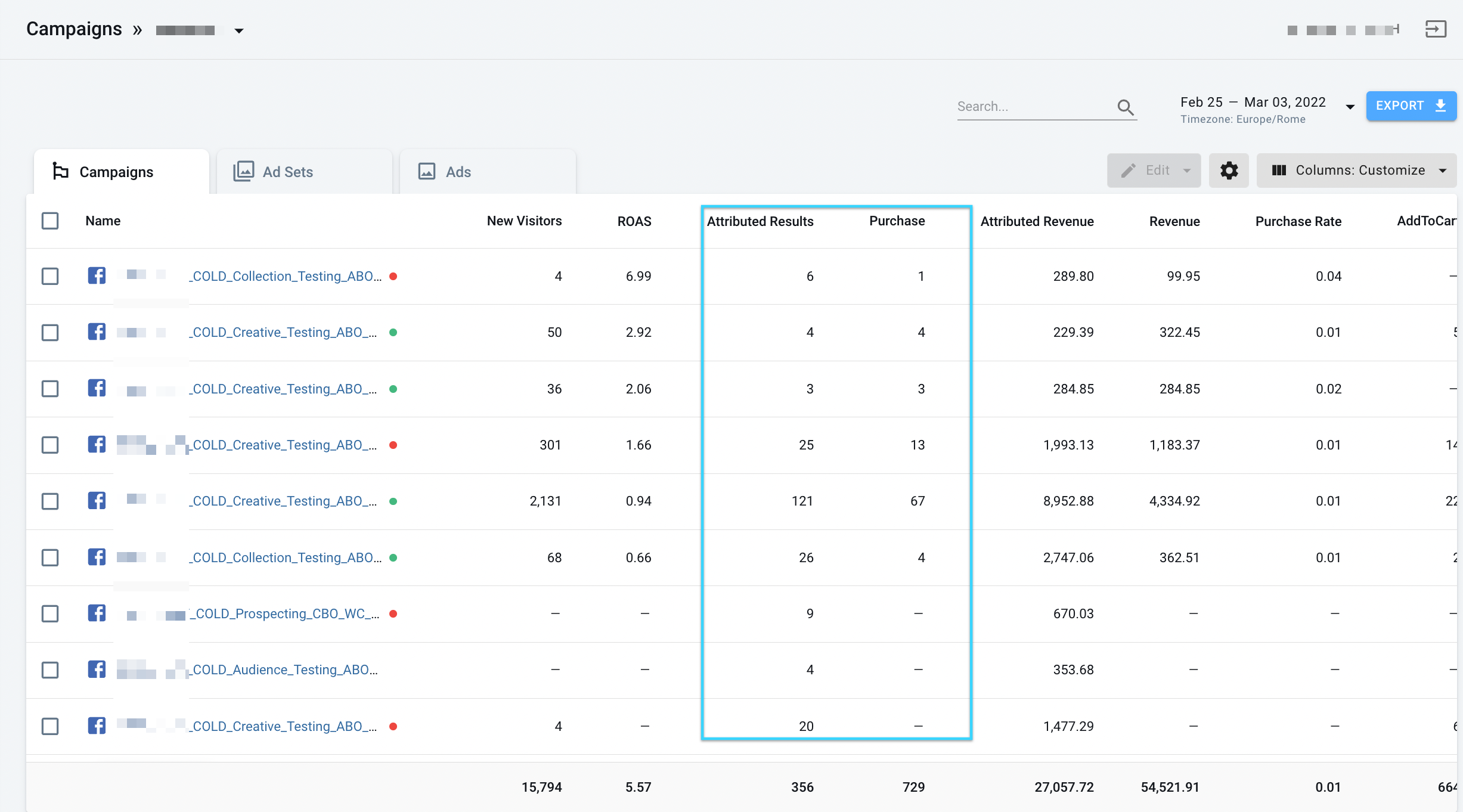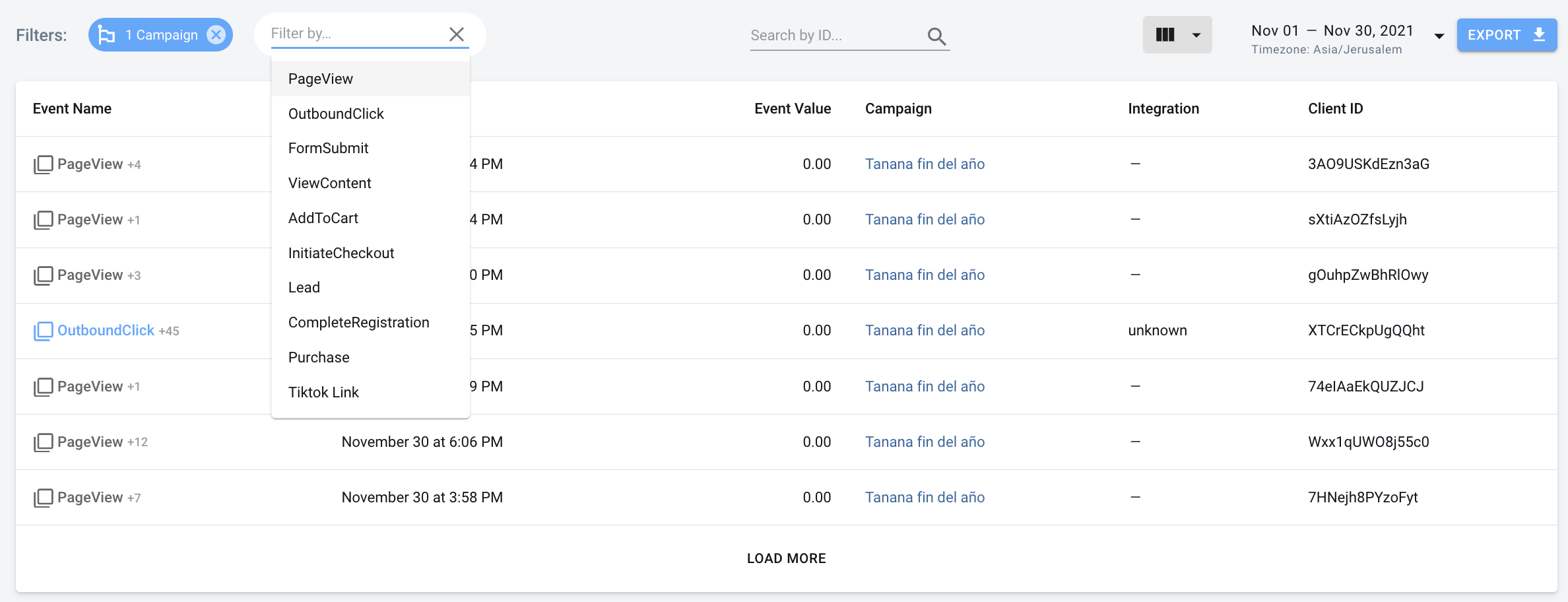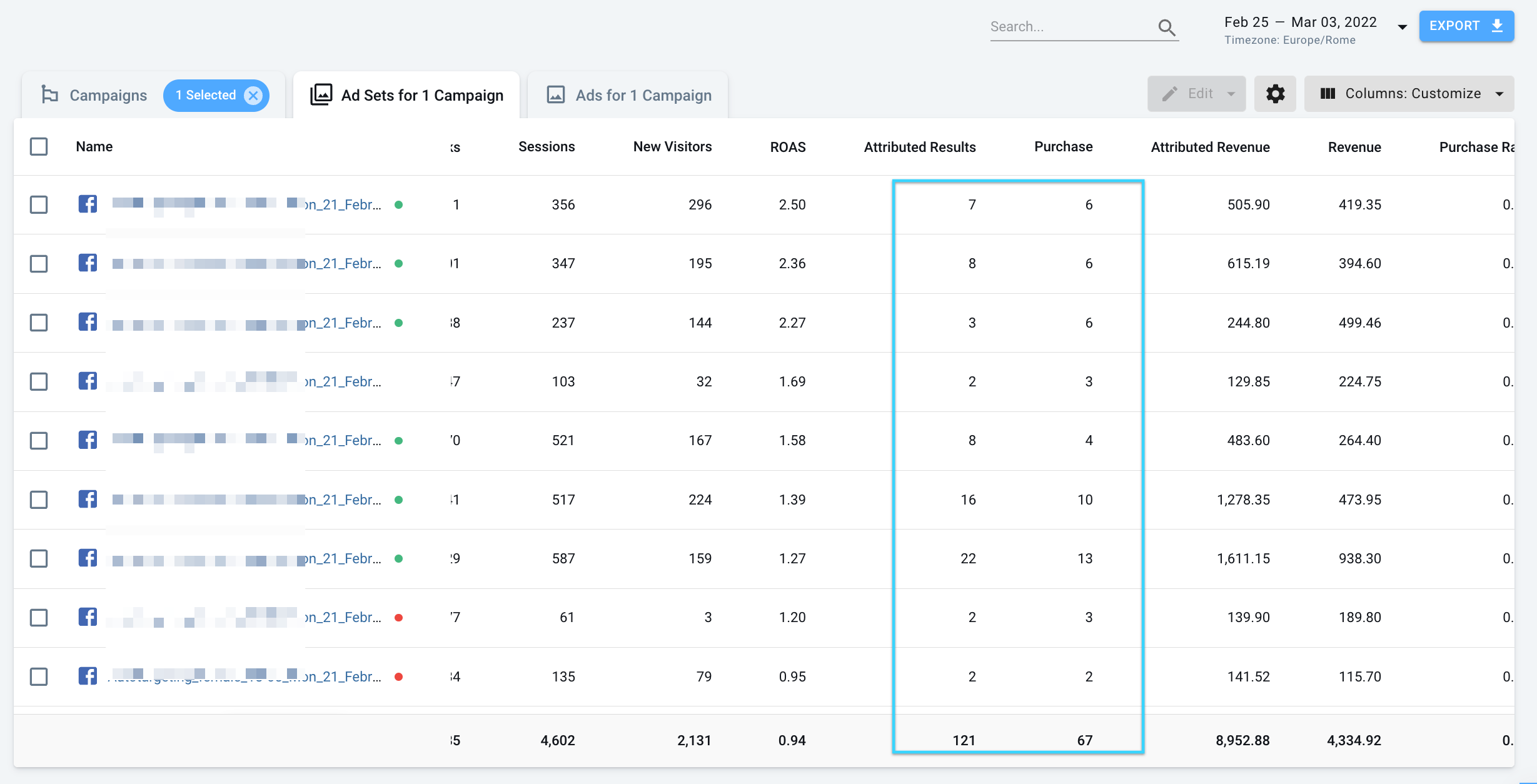The AnyTrack campaign reporting features exclusive functionalities that provide marketers with real time insights into marketing performances.
The AnyTrack campaign reporting features exclusive functionalities that give marketers real-time insights into marketing performances. The reports are built from several data sources, such as your ad account data, website data, conversion data, and customer data, so you can blend metrics and dimensions into a unified and rich reporting interface.
In this article, we will cover the following topics:
- The data sources and their characteristics used to build the campaign reports
- Definitions of metrics and dimensions found in the reports
- How to read the Attributed Conversions vs. Purchase reports
- The role of the UTM Parameters and how to use the URL Tracking Templates
- How to use each function to get more out of your campaign data
- How to understand data discrepancies
Prerequisites:
- You need admin access to your ad accounts
- These reports are currently available for Facebook Ads and Google Ads
- Your ad account integration must be enabled
- You must use the recommended URL tracking templates
- Conversion API server side events must be enabled
- Your ad campaign conversion goal must be the Purchase event
- We also recommend connecting your Google Analytics account
Before we begin, let's review some definitions that will help you understand what each functionality, metric, and dimension represent and where they are sourced from.
The reports data sources:
The campaign reports are composed of 3 primary data sources, which can be queried together to find interesting segments or campaign performances based on specific events or integrations.
Your Ad Network Campaign Data
When you connect your ad accounts with AnyTrack, we will start fetching your campaign data into your AnyTrack account.

Dimensions
- Campaigns
- Ad Groups (for Google Ads), Ad Sets (for Facebook Ads)
- Ads
- Keywords (for Google Ads)
Metrics
- Reach, impressions
- Link Clicks, Clicks
- Ad Spend
- CPM, CPC, etc...
- Frequency
- Attributed Conversions:
The conversions that AnyTrack sent to your ad account and have been successfully attributed by the ad network. More info follows below. - Attributed Revenues:
The revenues that AnyTrack has sent along with the conversions and are being reported in your ad account.
AnyTrack Client Side Data
This is the data collected through the AnyTrack JS Tag
- Sessions and user types (New vs. Returning);
- Customer journey events such as Add To Cart, FormSubmit, InitiateCheckout;
- Calculated metrics such as:
- Click Through Rate
- Engagements
- UTM Parameters
- ClickID parameters
AnyTrack Server Side Data
This is the data that AnyTrack receives from your Conversion Sources integrations via API, Postback URLs, and Webhooks.
Reminder: Conversion Sources Integrations are Shopify, ClickFunnels, and Affiliate Networks. The complete list can be found in the integration catalog.
Event Types:
- Purchase
- Complete Registration
- Lead
- Scheduled (For Calendly Integration)
- Custom Events (any custom event sent to AnyTrack)
Event Context:
- Integration (i.e., Shopify, Calendly, ClickBank)
- Brand Name
- Event Location (The page where the event took place)
- Landing Page (where the user landed)
- Element (What the user engaged with when on your website)
Event metrics:
- Event Count
- Event Revenue or commissions (for affiliate marketers)
AnyTack processes your data in real time and updates the reports in increments of 10-15 minutes. In addition to the metrics and dimensions from the various sources mentioned above, AnyTrack adds calculated metrics.
- Conversion Rates for each event type
- ROAS calculated from the Purchase Values received from your Conversion Sources and Ad Spending from your ad network
As mentioned before, because of the way AnyTrack collects, processes, and blends your data sources, you get exclusive insights into your campaign performances.
For example, AnyTrack real time reporting is not affected by iOS 14 tracking protection, compared to the attribution delays you'll experience with Facebook Ads (up to 72 hours) and Google Ads (up to 5 days).
Attributed Conversions vs. Actual ConversionsSince the introduction of iOS 14, the Facebook Pixel and Google Ads conversion tag are no longer capable of precisely attributing conversions, nor can they provide real time conversion data. Consequently, both ad networks have introduced Conversion Modeling and Aggregated Event Measurement (for Facebook).
These conversion modeling methods use various data points captured by their client side pixels and conversion APIs to attribute the conversions based on statistical and probability models.
⏳ The downside of Conversion Modeling is that it delays the reporting of the conversion in the ads manager by up to 72 hours and 5 days. (👉 references)
Definitions:
Attributed Conversions Column:
They are the conversions that AnyTrack has sent to your Conversion APIs, and successfully attributed to your campaigns, ad sets, and ads.
These conversions are processed by the ad networks according to your ad account settings such as:
- Attribution window
- Post view attribution
- Repeat rate (for Google Ads)
- Attribution model (first, last click, etc... )
Regardless of your ad account settings, AnyTrack will send the conversions based on the collected data and your AnyTrack settings.
AnyTrack Purchase Column
They are the purchase conversions that have been successfully tracked and attributed to your ads based on URL Tracking Parameters:
- Standard UTM Parmeters
- Ad_id URL parameter (the lowest level dimension from your ad account)
- Ad Network Click ID parameter - gclid, fbclid
Tracking, attribution, and reporting logic
AnyTrack can send the conversion data to your conversion API, whether you append the URL parameters to your ads or not. Since both Facebook and Google AutoTag their clickId to ad clicks, we automatically collect, track and classify these clicks according to their respective source.
Yet, to display reported conversions aligned with your ads, we use the ad_id parameter to match it with your ad account.
Therefore, it is paramount to leverage the tracking URL templates we provide to gain full and real time insights into your campaign performances.
Note: The Templates are available in your AnyTrack account under the Ads Integration Tab.

The Facebook Ads Tracking URL Template
You can bulk update your ads with the new URL template following this guide.
Note: Updating the ads with the template will send the ads to the review. So pick the right time to do so, or notify your Facebook rep about the change so they can expedite the process.
The template below can be used, but you should use the one available from your account.
utm_source=facebook&utm_medium=cpc&utm_content=&utm_campaign=&utm_term=&utm_id=&ad_id=&adset_id=&placement=&site_source_name=
The Google Ads Tracking URL Template
Google Ads lets you add a default tracking template at the account level. This is very useful as it allows to update all your current and future campaigns, ad groups, ads.
The template below can be used, but you should use the one available from your account.
{lpurl}?utm_source=google&utm_medium={ifsearch:cpc}{ifcontent:display}&utm_id={campaignid}&utm_content={adgroupid}&utm_term={keyword}&creativeId={creative}&adgroupid={adgroupid}&targetid={targetid}
How to analyze your campaign reports
As we outline in the introduction, the reports are composed of 3 data sources.
- Ad networks data (including costs and performance metrics)
- AnyTrack Data generated/triggered via the AnyTrack TAG
- Conversion Source Data received via your Integrations (Shopify, Affiliate Networks, CRMs)
Because AnyTrack joins these 3 data sources under a single report, if you skip one of the initial requirements, you will inevitably see some discrepancies in your reports, and you won't be able to make the most of the reports.
Reporting Features
The reports have many features designed to help you see your data according to your specific business needs.
Time Period
Query the reports according to the time span you want to analyze.
Customize the report columns
You can select the predefined columns according to your business goals - eCommerce, lead generation, and Affiliate marketing.
You can also fully customize the reports according to your specific needs.
For example, you can remove some Tracking Events that you are not tracking. i.e., Lead or OutboundClick.
Pause & Resume campaign
You can pause and resume campaigns directly from the report.
Attributed Results vs. Purchases
The Attributed Result Column represents the conversions that have been successfully attributed to your ads and according to your campaign objective.
The Purchase Column represents the conversions that Anytrack could successfully attribute to a specific Ad.
These metrics can therefore be compared so you can make better decisions.
Note: Currently, this metric can only be compared with the Purchase event tracked by AnyTrack. So if your campaign uses a different campaign objective, be sure to measure this conversion in AnyTrack so you can compare accordingly.
How to interpret the Attributed Results metrics
Attributed results are the conversions that have been successfully attributed to your ads. They depend on your campaign / Ad Set attribution settings, so keep that in mind when you look at these metrics.
Refer to the table to understand the factors that impact the data being displayed.
Why Attributed Results and purchases do not match?
Because of the many factors that impact these metrics, they will often, if not always, be different. This section will outline the main reasons for these discrepancies:
- Attribution Time: The AnyTrack Purchase event is reported and sent to Facebook API in real time. But Facebook Aggregated Event Measurement takes up to 72 hours to attribute the conversion. So the Attributed Results will always show a number that includes conversions that Anytrack has sent over the past 72 hours.
- Attribution Model and settings: Because AnyTrack doesn't know when a user "sees" an ad, but still sends conversions to the Facebook API, whether the conversions originated from a FB Ads click or not. If Facebook can attribute the conversion to an ad that has been Viewed by the user, it will attribute the conversion.
- Abandoned Cart & Email Marketing: If a user clicked on an ad and doesn't complete their purchase but comes back from an email marketing campaign:
- AnyTrack will track the conversion based on the last click and attribute the conversion to an email campaign.
- Anytrack will send the conversion to Facebook API, and Facebook will attribute the conversion to the last ad click or ad view.

Why and how do you benefit from these report discrepancies?
Because AnyTrack sends over 30 data points to the Facebook and Google APIs, you feed your ad pixels with all the data they need to train their ad optimization engine and maximize your conversion attribution rate.
- More attributed conversions = Better ad optimization
- Unlimited attribution window = Optimize your ads based on more data.
- Understand your conversion lifts = Understand what other sources impact your ad conversion rates.
- 7 days ROAS vs. LTV ROAS
These reports will evolve and be refined to provide you with additional insights into your ad campaign performances.
Review your campaign conversions
Selecting a campaign will display the option called “View Conversions” which allows you to see the exact conversions attributed to this campaign/ad set/ad.

After clicking on View Conversions, you will get to the Conversion Event page, where all events related to the campaign will be listed.
You can then filter in/out the specific conversions you want to review.

Campaign Drill Down
Select a campaign and drill down into the ad sets and specific ads to see a breakdown of your performances.

Conclusion
The campaign report is one of the key building blocks of the AnyTrack platform, and as we grow, it will evolve with additional features, and reporting metrics, so you can keep improving your marketing.
External references:
Facebook Delayed Reporting:
Real-time reporting is not currently supported, and data may be delayed up to 3 days. For iOS 14+ app installs campappns, conversion events will be reported based on the time that they are reported to Facebook by the SKAdNetwork API and not the time they occur. Web conversion events will be reported based on the time the conversions occur, not the time of the associated ad impressions.
(Read more on the Meta Support site here.)
Google Ads Delayed Reporting:
Yes, App campaign appeled conversions may take up to 5 days to appear, which is expected behavior. This modeling delay is in addition to existing conversion delays. Please also be aware that reporting for recent campaign performance will continue to be affected by modeling lags, and you should continue to be prepared for performance fluctuations. (Read more on the Google Support site)
